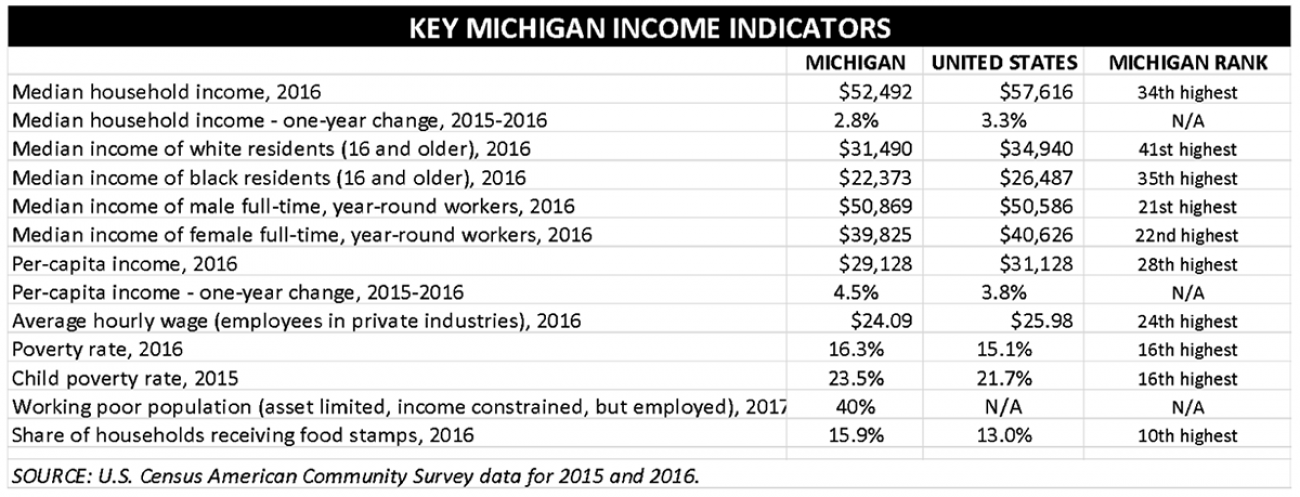Michigan income growth hindered by lack of college graduates

The incomes of Michigan workers took a big hit during the Great Recession. Incomes have recovered somewhat in recent years, but Michigan has not returned to its high-wage reputation during past decades of manufacturing might.
The state’s workers once made substantially more than the average American household (6 percent more in 2000); they’re now making almost 10 percent less – or about $425 a month less. The cause: loss of nearly 300,000 manufacturing jobs, many well-paying. And the jobs that have been created have largely been in the service sector and pay just over two-thirds, on average, as what a factory job pays.
Still, Michigan incomes have started to grow again during the multi-year recovery after the Great Recession. Total statewide personal income ($424 billion) and per capita income ($42,812) in 2015 were both about 13 percent higher than in 2010.
Related: Where they stand: Michigan governor candidates on college affordability
Related: Ignore the sticker price at Michigan universities. Here’s the real cost.



Michigan Lags in College Grads
In the United States, 31.3 percent of adults have a bachelor's degree or higher, a level of education that typically brings hundreds of thousands of dollars of additional lifelong income. Michigan's rate, 28.3 percent, has it ranked in the bottom third of the country.
Rank and percent with bachelor's degree or higher
#1 District of Columbia (56.8%)
#2 Massachusetts (42.7%)
#3 Colorado (39.9%)
#4 Maryland (39.3%)
#5 Connecticut (38.6%)
#36 Michigan (28.3%)
Source: U.S. Census 2016 American Community Survey data.
Path forward
Other states with more diverse economies have been able to embrace the information age and take advantage of the higher-paying jobs in technology and financial and professional services.
Take Massachusetts and Minnesota. Both have far more educated workforces compared to Michigan and the nation. Nearly 43 percent of Massachusetts adults have a college degree, as do nearly 35 percent of adult Minnesotans. In Michigan, the number is 28.3 percent, well below the national figure of 31.3.
(For perspective: If Michigan’s had the same college grad rate as Minnesota, the state would have 439,000 more college grads; if it had Massachusetts’ rate, it’d have nearly a million more grads.)
Here’s how that plays out: While Michigan’s median household income was $5,000 below the national average of $57,627 in 2016, Minnesota’s was nearly $8,000 higher. Massachusetts’ is nearly $18,000 higher. Michigan is now ranked 34th in income, down from 24th a decade earlier.
Related economic coverage from our 2018 Michigan Issue Guide
- Michigan business climate improves, but educated workforce is shrinking
- Demand for Michigan workers is very high, but many have given up looking
- Business incentives cost Michigan millions, and it’s uncertain they work
That’s because Massachusetts and Minnesota have far fewer factory workers and more in service-oriented jobs like finance, an industry where average weekly wages in Massachusetts ($2,500) and Minnesota ($1,673) are far higher than that same sector commands in Michigan ($1,298 a week).
Job losses, stagnant wages triggered a poverty increase
The impact extended beyond those working, many of whom were working for less money, to pushing many more into poverty. The poverty rate in Michigan soared from 13.2 percent in 2005 to more than 17 percent in 2011 (Massachusetts and Minnesota never climbed above 12 percent). The Michigan poverty rate remained above 16 percent in 2016.
Beyond the poor and unemployed, the working poor grew markedly. According to the United Ways of Michigan, the percentage of working families who struggled to meet the basic costs of living grew substantially. More than 950,000 Michigan households have wage earners, but are considered working poor with few assets and constrained incomes.
Pain, progress not evenly distributed
Across the state, the minority population was harder hit by the Great Recession. The poverty rate among African-Americans, already high, climbed to more than 36 percent in 2012. That has seen a ripple effect in a number of larger cities, including Detroit, Flint, Muskegon and Saginaw, which have larger African-American populations.
In Detroit and Flint, more than half of children under 18 live in poverty and more than a third of all residents. Median household income in Flint was $24,863 and it was $25,764 for Detroit in 2016, according to the U.S. Census’ American Community Survey. Yet in other parts of the state, incomes are far higher, like in Ann Arbor ($55,990), Grand Rapids ($40,355) and in Metro Detroit suburbs like Plymouth ($75,949), Warren ($43,523) and Bloomfield Hills ($172,768).
Again, education is a factor: In Bloomfield Hills and Ann Arbor, more than 70 percent of adults have a college degree; in Plymouth, it’s 54.4 percent and in Grand Rapids it’s 31.6 percent. But in Detroit just 11.5 percent of adults have a college degree and in Flint it’s 9.7 percent.
KEEP DIGGING: MORE INFORMATION ON MICHIGAN INCOMES:
- Bridge Magazine: Michigan’s Stumbling Middle Class
- U.S. Federal Reserve: Report on the Economic Well-Being of U.S. Households in 2016
- University of Michigan researchers: The economic and demographic outlook for Michigan through 2045
- U.S. Bureau of Labor Statistics: The growth of income inequality in the United States
Explore the Facts & Issues Guide:
At A Glance
Slideshows…
Education & Talent
- K-12 Student Performance: Michigan's K-12 performance dropping at alarming rate
- School Reform: Many Michigan K-12 reform ideas are jumbled, broad, or wildly expensive
- Early Childhood: Michigan preschool funding has improved, but child care still unaffordable
- Higher Ed: College funding cuts in Michigan have led to fewer students, greater debt
Economy & Prosperity
- Economy: Michigan business climate improves, but educated workforce is shrinking
- Jobs & Labor: Demand for Michigan workers is very high, but many have given up looking
- Incomes: Michigan income growth hindered by lack of college graduates
- Business: Business incentives cost Michigan millions, and it’s uncertain they work
Quality of Life
- Public Health: Michigan's adverse health trends track along racal, poverty lines
- Health Care: Health care in rural Michigan communities suffering, despite Obamacare
- Safety Net: $1B of Michigan’s welfare money goes to college students who aren’t poor
- Water Issues: Michigan's Great Lakes are good, but water concerns include lead and Line 5
- Lands & Energy: Michigan battling 22 invasive forest species, high electric bills
- Michigan Tourism: Does state make $8.33 for every $1 spent on Pure Michigan campaign?
- Infrastructure: Michigan needs $4B more per year for infrastructure, but how to pay for it?
- Cities: In Michigan, more than 150 communities are financially distressed
- Rural Michigan: Limited Internet in rural Michigan depresses student, business opportunity
- Public Safety: Michigan pays 18% less per citizen than nat'l average for public safety
Government & Reform
- Michigan Taxes: Michigan gives more tax breaks than it collects for schools, government
- State Spending: Big government? Michigan's state, local workforce 2nd smallest in nation
- Ballot Issues: 2018 Michigan ballot initiatives may decide marijuana, gerrymandering
- Gov't Reform: Despite low trust of gov't, Michigan legislators have done little to change
Who We Are & The Facts on Our Facts
See what new members are saying about why they donated to Bridge Michigan:
- “In order for this information to be accurate and unbiased it must be underwritten by its readers, not by special interests.” - Larry S.
- “Not many other media sources report on the topics Bridge does.” - Susan B.
- “Your journalism is outstanding and rare these days.” - Mark S.
If you want to ensure the future of nonpartisan, nonprofit Michigan journalism, please become a member today. You, too, will be asked why you donated and maybe we'll feature your quote next time!

